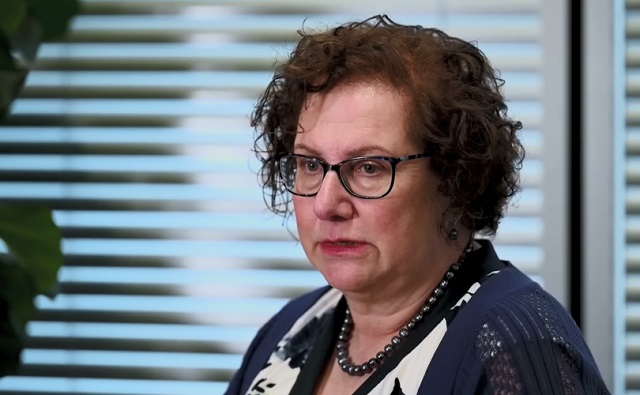COVID-19
Academics Raise Concerns About UK Covid-19 Inquiry

From the Brownstone Institute
BY
Over 50 prominent UK academics have signed an open letter to Baroness Heather Hallett, chair of the UK Covid-19 Inquiry, calling for urgent action to address the shortcomings of the probe so far. The signatories of the letter say the Hallett Inquiry suffers from bias, false assumptions, and a lack of impartiality.
“The Covid Inquiry is not living up to its mission to evaluate the mistakes made during the pandemic, whether Covid measures were appropriate, and to prepare the country for the next pandemic,” they write.
Kevin Bardosh, lead signatory and Director of Collateral Global has been following the Inquiry closely. He’s concerned it has focused too much on “who said what and when,” rather than homing in on key scientific questions about the evidence (or lack thereof) underpinning policy decisions.
 Prof Kevin Bardosh, Director of Collateral Global. Photo credit: Shutterstock
Prof Kevin Bardosh, Director of Collateral Global. Photo credit: Shutterstock
“The Inquiry was pre-designed on the assumption that the government ‘didn’t do enough’ to protect people during the pandemic,” says Bardosh. “But the thing about the pandemic is that more measures, didn’t mean more lives saved. It’s a paradoxical aspect of health policy that more doesn’t necessarily mean better.”
Bardosh, who is affiliated with University of Edinburgh Medical School, says because the Inquiry’s starting position is that non-pharmaceutical interventions (e.g. masks) and lockdowns were necessary and effective, it’s not actually interrogating the trade-offs of these policies.
“If you go back to pre-Covid, policies like lockdowns, extended school closures, and contact tracing for a respiratory virus, were not the ‘scientific consensus’ for how to respond rationally to a pandemic,” he says. “In fact, the reverse was true. The goal was to minimise the disruption to society because it would have all these short and long-term unintended consequences.”
In December 2023, when Prime Minister Rishi Sunak was questioned at the Inquiry, he admitted the UK government had failed to discuss the costs and benefits of pandemic policies.
 UK Prime Minister Rishi Sunk questioned at UK Covid Inquiry
UK Prime Minister Rishi Sunk questioned at UK Covid Inquiry
Sunak pointed to a peer-reviewed report by Imperial College London and the University of Manchester that applied a Quality-Adjusted Life Year analysis to the first lockdown in the UK and found “for every permutation of lives saved and GDP lost, the costs of lockdown exceed the benefits.” [emphasis added]
Bardosh has also called out the Inquiry for its double standards in scrutinising experts.
Take for example, Neil Ferguson, professor at Imperial College and former SAGE member. He was the architect behind lockdowns after his March 2020 models warned that 500,000 Brits would die unless tougher restrictions were put in place to curb spread of the virus.
Bardosh says, “The Inquiry hasn’t really questioned Ferguson’s mathematical model in any substantial way. But if you compare that to the questioning of Professor Carl Heneghan, who’s based out of Oxford, it was very confrontational, and they used provocative language to suggest he didn’t have expertise in this area.”
Heneghan, the director of Oxford’s Centre for Evidence-Based Medicine, was among 32 senior UK academics who urged then-Prime Minister, Boris Johnson to think twice about plunging Britain into a second lockdown in the autumn of 2020.
It was revealed during evidence to the Inquiry, that the UK’s Chief Scientific Adviser, Dame Angela McLean, called Heneghan a “fuckwit” on a WhatsApp chat during a September 2020 Government meeting for his dissenting views on lockdowns.
 Prof Carl Heneghan, director of Centre of Evidence-Based Medicine, Oxford
Prof Carl Heneghan, director of Centre of Evidence-Based Medicine, Oxford
Later, Heneghan penned a scathing article in The Spectator, calling the Inquiry a “farce – a spectacle of hysteria, name-calling and trivialities.”
“Lockdown was the most disruptive policy in British peacetime history, with huge ramifications for our health, children’s education and the economy,” wrote Heneghan.
“This is an opportunity for the inquiry to gather evidence and ask whether lockdown and other interventions actually worked…Instead we have a KC [King’s Counsel] who seems uninterested in substance and obsessed with reading out rude words he has found in other people’s private messages.”
Bardosh and the other signatories have also raised concerns about the structure of the scientific advisory groups in the Inquiry, which have omitted key experts in child development, schooling impacts, social, and economic policy.
“The Inquiry must invite a much broader range of scientific experts with more critical viewpoints. It must also review the evidence on diverse topics so that it can be fully informed of relevant science and the economic and social cost of Covid policies to British society,” write the signatories.
So far, Bardosh is unimpressed with the ‘political theatre’ of the Inquiry, but hopes Baroness Hallett will urgently address its shortcomings to avoid compromising the credibility of future public inquiries.
“Not having an inquiry that really asks those questions is very damaging to the idea of accountability. We need to hold to account the policy decisions that were made because if we don’t, the next time there’s a public health emergency, these measures will come back into place whether or not they actually work,” says Bardosh.
The Hallett Inquiry is slated to run until 2026 and is reported to be one of the largest public inquiries in UK history. The cost of the UK government’s Covid measures are estimated to be between £310bn and £410bn.
Republished from the author’s Substack
COVID-19
NIH Quietly Altered Definition For Gain-Of-Function Research On Its Website, Former Fauci Aide Confirms

 From the Daily Caller News Foundation
From the Daily Caller News Foundation
By JASON COHEN
National Institutes of Health (NIH) Principal Deputy Director Lawrence Tabak confirmed on Thursday that his agency’s communications department altered NIH’s definition for gain-of-function research, with the change being “vetted” by “experts.”
The NIH until Oct. 20, 2021 defined this research as “modif[ying] a biological agent so that it confers new or enhanced activity to that agent,” while “some scientists use the term broadly to refer to any such modification,” according to the House Oversight Committee. Republican Rep. Nicole Malliotakis of New York questioned Tabak, a former aide to Dr. Anthony Fauci, about the agency changing its definition of the research on its website, asking him who authorized the alteration.
WATCH:
The current website does not define gain-of-function research, but asserts this research is usually uninvolved with enhanced potential pandemic pathogens.
“The change was made by our communications department because of the confusion that people have about the generic term of gain-of-function and the specific term gain-of-function,” Tabak testified.
Malliotakis responded by suggesting the communications department would not be qualified to make a change like this and must have had other input.
“The content was vetted,” Tabak testified. “By individuals who are subject-matter experts.”
Fauci firmly denied that the National Institute of Allergy and Infectious Diseases (NIAID) funded gain-of-function research on bat-based coronaviruses at the Wuhan Institute of Virology (WIV) before the COVID-19 pandemic during a Senate hearing in May 2021.
“The NIH has not ever and does not now fund gain of function research in the Wuhan Institute of Virology,” Fauci said.
Tabak testified on Thursday that the NIH did fund this research at the Wuhan Institute of Virology, but it “depends on [the] definition.”
The NIAID, which Fauci previously led, funded the nonprofit group EcoHealth Alliance to study bat-based coronaviruses in China that consisted of the transfer of $600,000 to the WIV, the Daily Caller News Foundation previously reported.
COVID-19
COVID Lab Leak: Over four later, EcoHealth Alliance funding is finally suspended

From Heartland Daily News
Thursday, May 16, 2024
Federal Funding Stripped From Nonprofit at Center of COVID Lab Leak Controversy
Today, the Biden administration suspended federal funding to the scientific nonprofit whose research is at the center of credible theories that the COVID-19 pandemic was started via a lab leak at the Wuhan Institute of Virology.
This morning, the U.S. Department of Health and Human Services (HHS) announced that it was immediately suspending three grants provided to the New York-based nonprofit EcoHealth Alliance (EHA) as it starts the process of debarring the organization from receiving any federal funds.
“The immediate suspension of [EcoHealth Alliance] is necessary to protect the public interest and due to a cause of so serious or compelling a nature that it affects EHA’s present responsibility,” wrote HHS Deputy Secretary for Acquisitions Henrietta Brisbon in a memorandum signed this morning.
For years now, EcoHealth has generated immense controversy for its use of federal grant money to support gain-of-function research on bat coronaviruses at the Wuhan lab.
In a memo justifying its funding suspension, HHS said that EcoHealth had failed to properly monitor the work it was supporting at Wuhan. It also failed to properly report on the results of experiments showing that the hybrid viruses it was creating there had an improved ability to infect human cells.
Congressional Republicans leading an investigation into EcoHealth’s research in Wuhan, and the role it may have played in starting the pandemic via a lab leak, cheered HHS’s decision.
“EcoHealth facilitated gain-of-function research in Wuhan, China without proper oversight, willingly violated multiple requirements of its multimillion-dollar National Institutes of Health [NIH] grant, and apparently made false statements to the NIH,” said Rep. Brad Wenstrup (R–Ohio), chair of the House’s Select Subcommittee on the Coronavirus Pandemic in a statement. “These actions are wholly abhorrent, indefensible, and must be addressed with swift action.”
Beginning in 2014, EcoHealth received a grant from NIH’s National Institute of Allergies and Infectious Diseases (NIAID) to study bat coronavirus in China. Its initial scope of work involved collecting and cataloging viruses in the wild and studying them in the lab to spot which ones might be primed to “spillover” into humans and cause a pandemic.
Soon enough, EcoHealth used some of the viruses they’d collected to create “chimeric” or hybrid viruses that might be better able to infect human lung cells in genetically engineered (humanized) mice.
This so-called “gain-of-function” research has long been controversial for its potential to create deadly pandemic pathogens. In 2014, the Obama administration paused federal funding of gain-of-function research that might turn SARS, MERS, or flu viruses into more transmissible respiratory diseases in mammals.
In 2016, NIH flagged EcoHealth’s work as likely violating the 2014 pause.
EcoHealth President Peter Daszak argued to NIH at the time that the viruses his outfit was creating had not been proven to infect human cells and were genetically different enough from past pandemic viruses that they didn’t fall under the Obama administration pause.

Wuhan Institute of Virology and Peter Daszak of EcoHealth Alliance
NIH accepted this argument under the condition that EcoHealth immediately stop its work and notify the agency if any of its hybrid viruses did show increased viral growth in humanized mice.
But when these hybrid viruses did show increased viral growth in mice, EcoHealth did not immediately stop work or notify NIH. It instead waited until it submitted an annual progress report in 2018 to disclose the results of its experiments.
A second progress report that EcoHealth submitted in 2021, two years after its due date, also showed its hybrid viruses were demonstrating increased viral growth and enhanced lethality in humanized mice.
In testimony to the House’s coronavirus subcommittee earlier this month, Daszak claimed that EcoHealth attempted to report the results of its gain-of-function experiments on time in 2019, but was frozen out of NIH’s reporting system.
The HHS memo released today says a forensic investigation found no evidence that EcoHealth was locked out of NIH’s reporting system. The department also said that EcoHealth had failed to produce requested lab notes and other materials from the Wuhan lab detailing the work being done there and the lab’s biosafety conditions.
These all amount to violations of EcoHealth’s grant agreement and NIH grant policy, thus warranting debarment from future federal funds, reads the HHS memo.
That EcoHealth would be stripped of its federal funding shouldn’t come as too great a shock to anyone who watched Daszak’s congressional testimony from earlier this month. Even Democrats on the committee openly accused Daszak of being misleading about EcoHealth’s work and manipulating facts.
Rep. Raul Ruiz (D–Calif.), the ranking Democrat on the House’s coronavirus subcommittee, welcomed EcoHealth’s suspension, saying in a press release that the nonprofit failed its “obligation to meet the utmost standards of transparency and accountability to the American public.”
An HHS Office of the Inspector General report from last year had already found that EcoHealth had failed to submit progress reports on time or effectively monitor its subgrantee, the Wuhan Institute of Virology.
When grilling Daszak, Democrats on the Coronavirus Subcommittee went to great lengths to not criticize NIH’s oversight of EcoHealth’s work. The HHS debarment memo likewise focuses only on EcoHealth’s failures to abide by NIH policy and its grant conditions.
Nevertheless, it seems pretty obvious that NIH was failing to abide by the 2014 pause on gain-of-function funding when it allowed EcoHealth to go ahead with creating hybrid coronaviruses under the condition that they stop if the viruses did prove more virulent.
NIH compounded that oversight failure by not stopping EcoHealth’s funding when the nonprofit did, in fact, create more virulent viruses, and not following up on a never-submitted progress report detailing more gain-of-function research until two years later.
The House Subcommittee’s investigation into NIH’s role in gain-of-function research at the Wuhan lab is ongoing. Tomorrow it will interview NIH Principal Deputy Director Lawerence Tabak. In June, it will interview former NIAID Director Anthony Fauci.
Originally published by Reason Foundation. Republished with permission.
-

 Automotive2 days ago
Automotive2 days agoGovernments in Canada accelerate EV ‘investments’ as automakers reverse course
-

 conflict1 day ago
conflict1 day agoWhite House Reportedly Worried About Russia’s Sudden Momentum Months After Biden Declared Putin ‘Already Lost’ War
-

 Health2 days ago
Health2 days agoSouth Korean president declares low birth rate a ‘national emergency,’ plans new ministry to address it
-

 Crime1 day ago
Crime1 day agoSlovakian prime minister who opposed WHO Pandemic Treaty shot in assassination attempt
-

 Alberta2 days ago
Alberta2 days agoFortis et Liber: Alberta’s Future in the Canadian Federation
-

 COVID-1919 hours ago
COVID-1919 hours agoNIH Quietly Altered Definition For Gain-Of-Function Research On Its Website, Former Fauci Aide Confirms
-

 Health2 days ago
Health2 days agoUK pediatrician who led review of child ‘transitions’ says US medical groups ‘misleading the public’
-

 Crime16 hours ago
Crime16 hours agoThe US Canadian border: Greatest number of terrorist watch list individuals being apprehended at northern border







